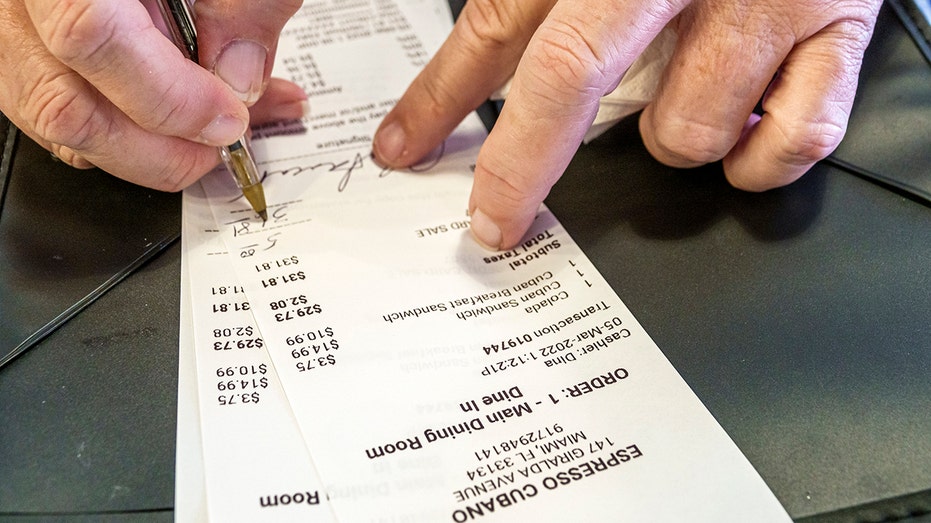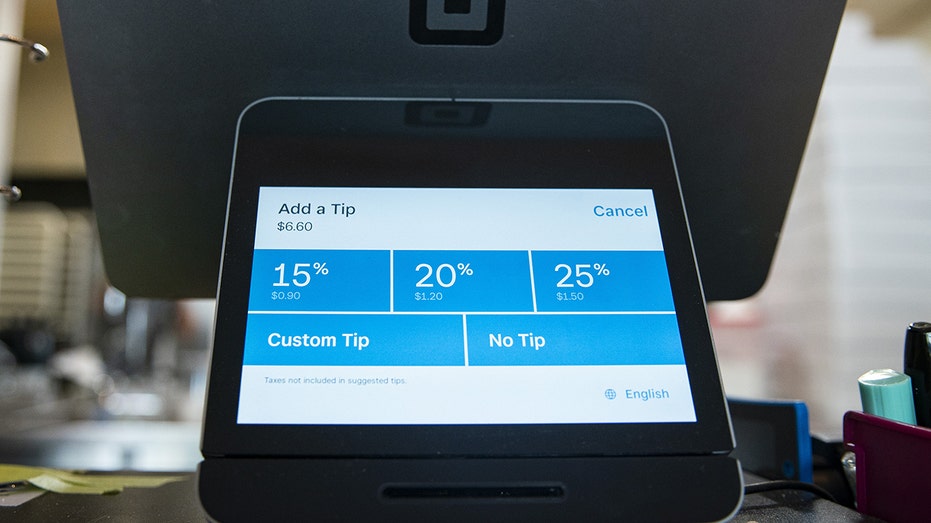
Fox News host Jimmy Failla reacts to a ski resort’s decision to file a lawsuit to keep influencers off the slopes and discusses American tipping culture.
A significant majority of Americans — nearly 75% — think tipping has gotten « out of control, » according to a recent survey from WalletHub.
Over 60% of consumers also think of a tip as something one should give when they feel like it, rather than an obligation every time, according to the survey results. About half of respondents said they often leave a tip because of « social pressure » rather than good service.
Nearly 70% of people believe that tips should only get split between the employees who provide the service and 78% believe automatic tipping charges should get banned, according to the data.
MAJORITY OF AMERICANS TAKE NOTICE IN THE RISE OF ‘TIPFLATION’ ACROSS INDUSTRIES

Coral Gables, Florida, pedestrian plaza and restaurant row, Espresso Cubano, signing credit card receipt. (Jeffrey Greenberg/UCG/Universal Images Group via Getty Images / Getty Images)
Dr. Melissa Dallas, professor emeritus, department of hospitality leadership at Missouri State University, is in agreement with respondents to the survey, saying « the tipping culture has become out of control » and it’s partly because of the reduced profit margins experienced by many businesses in recent years.
It’s become more common « for consumers to select their percentage to tip starting at 15% at a minimum, » she said.
IS PAYMENT TECHNOLOGY CONVINCING YOU TO OVER-TIP?
But « this changed culture has been detrimental » to both consumers and tipped employees, Dallas warned.
« Consumers are increasingly growing weary of the higher expected tips requested for many more services than ever before. Needless to say, this can be taxing on the disposable income levels of consumers at a time when prices for most goods and services have increased markedly, » Dallas said.

A Square payment device at a coffee shop in the Union Market district in Washington, DC, US, on Friday, Sept. 8, 2023. (Al Drago/Bloomberg via Getty Images / Getty Images)
But at the same time, « tipped employees are feeling financial hardships due to the recent economic downturn and pursuant challenges, » she said, adding that « a 15% tip just does not pay for things that a tipped employee needs like it used to. »
Another issue is that three in five respondents believe that businesses are replacing employee salaries with customer tips.
According to the Department of Labor, an employer of a tipped employee is only required to pay $2.13 per hour in direct wages if that amount combined with the tips received at least equals the federal minimum wage.
GET FOX BUSINESS ON THE GO BY CLICKING HERE
« Basically, the tip credit acts as an off-set for employers by allowing employers to count tips towards the regular minimum wage requirement for employees, » Misty Marris, co-managing partner at Gordon Rees Scully Mansukhani LLP, told FOX Business.
Many states require higher direct wage amounts for tipped employees, but Marris said there « are huge differences as to how the tip credit is applied across the country. »
For instance, there are seven states that do not allow for the tip credit, including California. It means the employer is required to pay a typical tipped employee minimum wage and then the tipped employees keep tips on top of that, according to Marris. Some states only meet the federal standard while others set a higher number.
From an employee perspective, Marris said « getting paid minimum wage plus tips on paper sounds like it is ideal and would lead to higher overall wages, but [there are] other nuances in the law, so that is not always the case. »
She noted that « many states allow for tip pooling, meaning all the tips are combined and distributed. » That pool can include traditionally tipped workers as well as back of the house like dishwashers and bussers.
« In other areas, service charges are replacing traditional tip percentages, » she added. But « there is a debate about the consequences of eliminating the tip credit and whether, overall, it benefits employees. Once thing is for sure, it is a thorny legal landscape that is ever changing, »Marris said.
